Saturday, August 30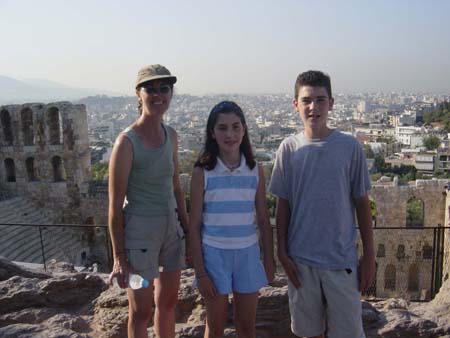
Steve: It was definitely all of the 108 degrees that
was forecasted for today - this was the hottest day any of us could remember.
It was hard to be in the direct sun for more than a few minutes at a time,
and there's unfortunately very little shade in Athens… Fortunately, we
were successful in getting started early, and we arrived at the Acropolis
by 9:00 AM. 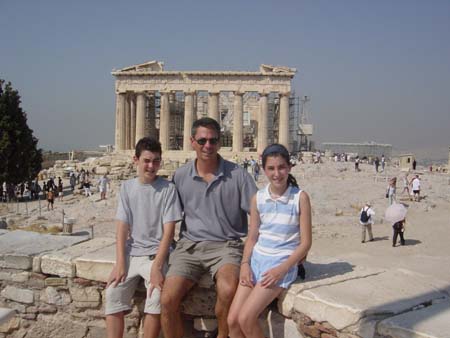
The Acropolis and its temples were as impressive as Paula and I remembered.
The only difference is the major reconstruction that is going on - the sign
said that it started in 1983, which was the year after we were here last.
Twenty years, and it's still going strong - there's scaffolding everywhere.
Despite the construction, it is still awesome to see and admire the architectural
achievement that dates back to 450 BC. The detail of the work and the brilliance
of the design are remarkable. We took our time walking through the Acropolis
and its museum, carefully reading about each site that we saw. David and Katie
were very engaged, which was great to see. The time we spent reviewing Greek
history before going to the Acropolis was definitely well-spent. 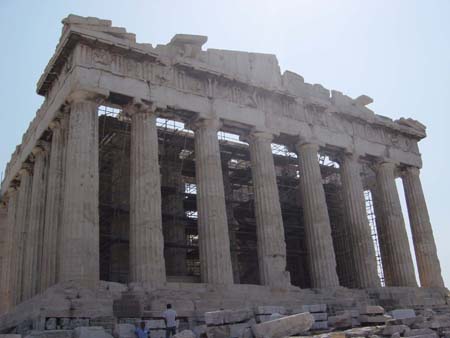
We didn't remember quite how sweeping the views were from on top of the Acropolis.
All of Athens is visible, and it's amazing to see how densely populated this
area is. We could see huge areas jammed with cement block buildings that go
on forever. Unfortunately, the smog of Athens is clearly visible. We've read
that this is a major concern for next year's Olympics. Many experts have warned
the International Olympic Committee that the air will not be suitable for
the athletes. Athens has taken many steps to reduce pollution, but none have
worked. The Metro was supposed to reduce the number of cars on the road, but
apparently it only resulted in a shift from other forms of public transportation
- people who drove into the city continued to do so. Athens also implemented
a law that regulated the number of cars that could drive into the city on
any given day - even-numbered license plates could only drive on even days
and odd-numbered plates on odd days. However, people got around this by buying
second cars so that they'd have one car that could legally drive into the
city on each day.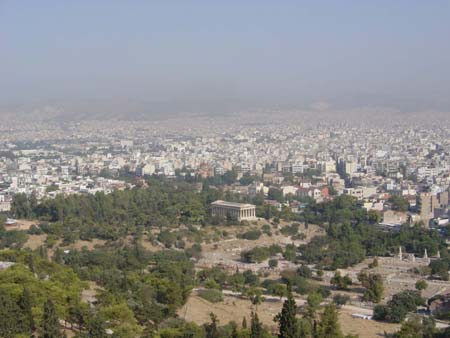
We especially enjoyed the Acropolis Museum. It contains a variety of sculptures and artifacts recovered on the Acropolis. It was amazing to see the quality of work dating back over 2,500 years.
After leaving the Acropolis, we walked through the Theater of Dionysos, one
of the best preserved ancient theaters in the world. The theater used to seat
over 17,000 Athenians, and there are 20 seats that have been preserved. It
was fun to sit in the theater and imagine what it was like to be here during
the Golden Age of Athens.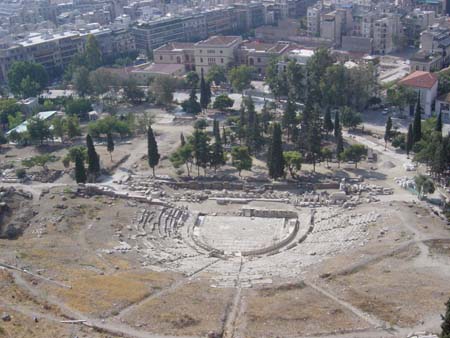
We took a quick ride on Athens' brand new subway so that we could go downtown to buy some travel books for Italy and Spain. The stations are shiny and bright - quite a contrast from what we're used to! There are displays in each station of all the artifacts that were discovered during the construction of the system.
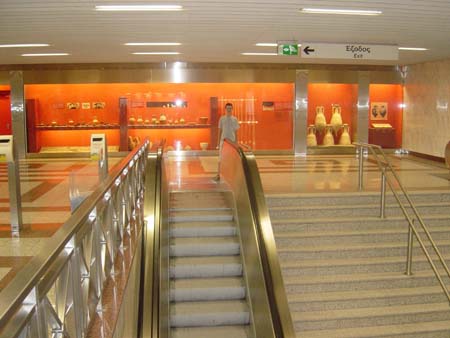
We spent much of the afternoon in our hotel, escaping the heat and catching up some more on our reading and writing. Tomorrow we're taking a day-trip to Delphi, which we're very much looking forward to. Maybe it will rain!
Distance Walked: 2.76 miles
David's Download… Ancient Athenian Democracy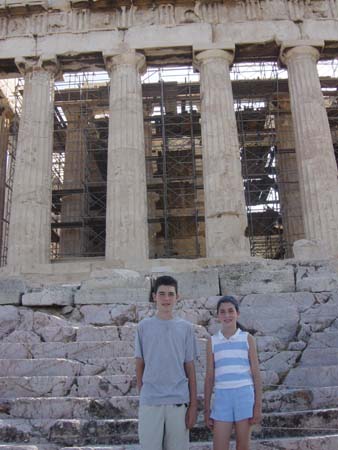
Today we visited the Acropolis in Athens and it was amazing. I have been learning about how the ancient Athenian's influenced Western Civilization. The ancient Athenian democracy was the first true foundation for democracy as we know it today. Solon, an Athenian statesman and legislator, is considered the founder of the democracy in Athens. He developed the main ideas of the present democracies, such as public assemblies and a government controlled by the people. When he came to power, he changed the lives of all Athenians and set the stage for democracies to come.
Solon was elected to take the government into his own hands during a time
of hardship for Athenians (594 B.C). An agricultural depression was sending
small farmers into slavery, and many political parties were threatening to
take power. He immediately cancelled all debts and mortgages. He also encouraged
the debt-stricken farmers to take up new occupations and trades. He then separated
the citizens into four classes, where each class had its own privileges and
duties. He believed that each class should receive privileges in proportion
to the burden it was able to bear. The political offices were given to members
of the first three classes, while the fourth class had the right to take part
in the public assembly. This was the first step to a popular government because
the people had total control over the administration. The public assembly
voted on the laws and policies for the community. Every free man, including
the poor, 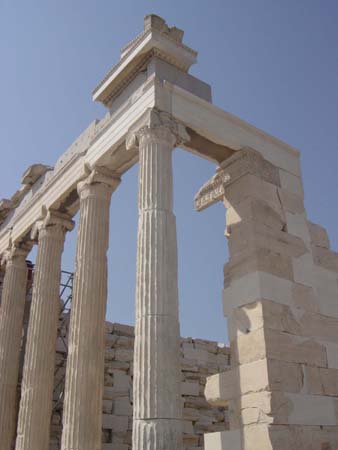 could
vote in the public assembly. Women and slaves could not take part in the assembly,
but had a set of privileges and protection laws. When a vote took place, each
man either put a white (yes) or a black (no) pebble into a pot. Today I actually
saw the place where this pot was placed (atop a huge rock near the acropolis)
and where hundreds of men voted on ancient political issues.
could
vote in the public assembly. Women and slaves could not take part in the assembly,
but had a set of privileges and protection laws. When a vote took place, each
man either put a white (yes) or a black (no) pebble into a pot. Today I actually
saw the place where this pot was placed (atop a huge rock near the acropolis)
and where hundreds of men voted on ancient political issues.
The assembly also had the power to ostracize (banish) someone from Athens
who they thought was getting too powerful and might try to take over. After
the assembly was created, a new council was formed to prepare proposals for
the assembly to vote on. This council was made up of four hundred members,
and met regularly to discuss proposals for the assembly. Each class also had
a set of military duties. The first three classes were to provide men for
the land army of Attica, while the fourth class was to provide rowers for
the navy. Athens had such a strong military and navy, because they were fighting
for their freedom and rights, while most of their opponents were forced to
fight and really had no reason to fight at all. Solon's 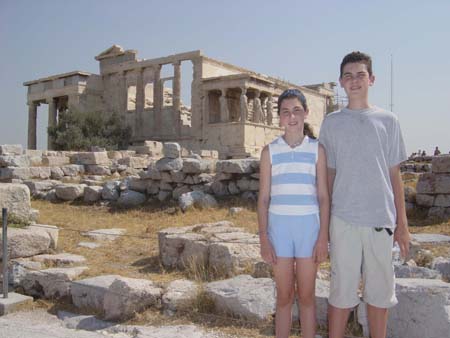 regulations
and ideas reached into every corner of life from marriage, to adoption, to
clothing and farming. Although it seemed that Solon was a great person and
no one could have disliked him, he was greatly opposed by the people. The
wealthy thought that the government was too democratic, while the poor disagreed
and believed that the government was not democratic enough. This got to be
too much for him, and he left for a period of ten years.
regulations
and ideas reached into every corner of life from marriage, to adoption, to
clothing and farming. Although it seemed that Solon was a great person and
no one could have disliked him, he was greatly opposed by the people. The
wealthy thought that the government was too democratic, while the poor disagreed
and believed that the government was not democratic enough. This got to be
too much for him, and he left for a period of ten years.
Solon's democratic government had many differences from our present form of government. He created a direct democracy, where all citizens could vote and speak in the government. We have a representative democracy, where we vote for people to represent us in the government. Everyone is treated equal in a representative democracy, but in a direct democracy, woman and slaves don't have the same rights as men. By the middle of the twentieth century, almost every independent nation in the world had some form of a democracy, or practiced some of the principles of democracy. We have Solon to thank for that!
